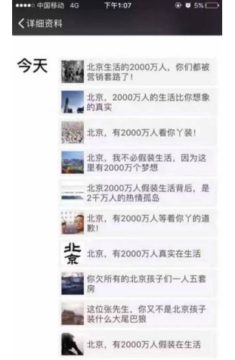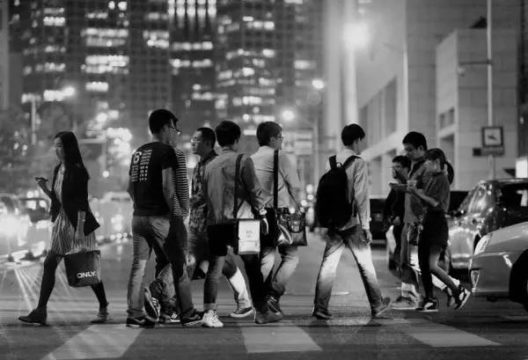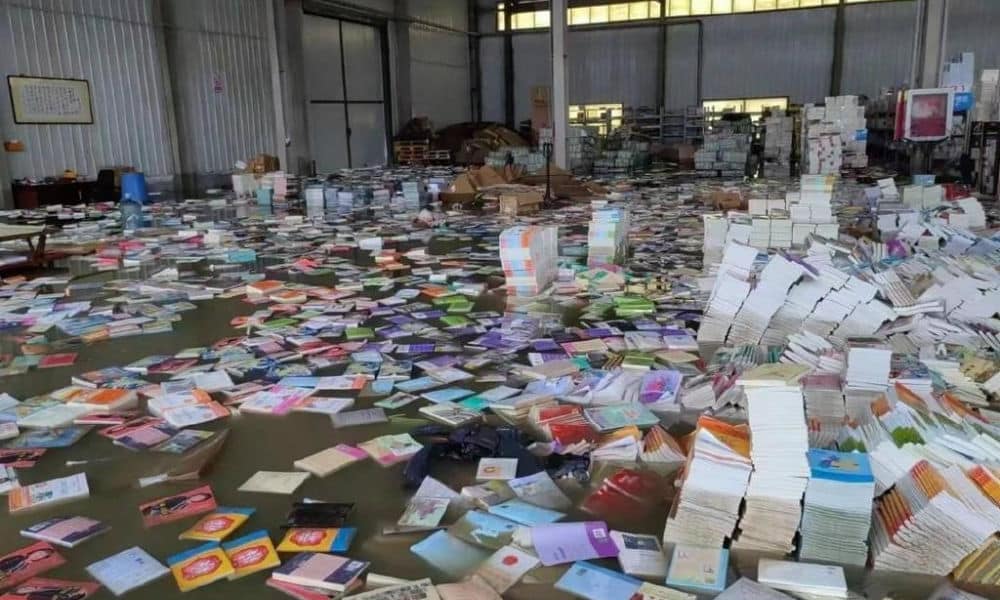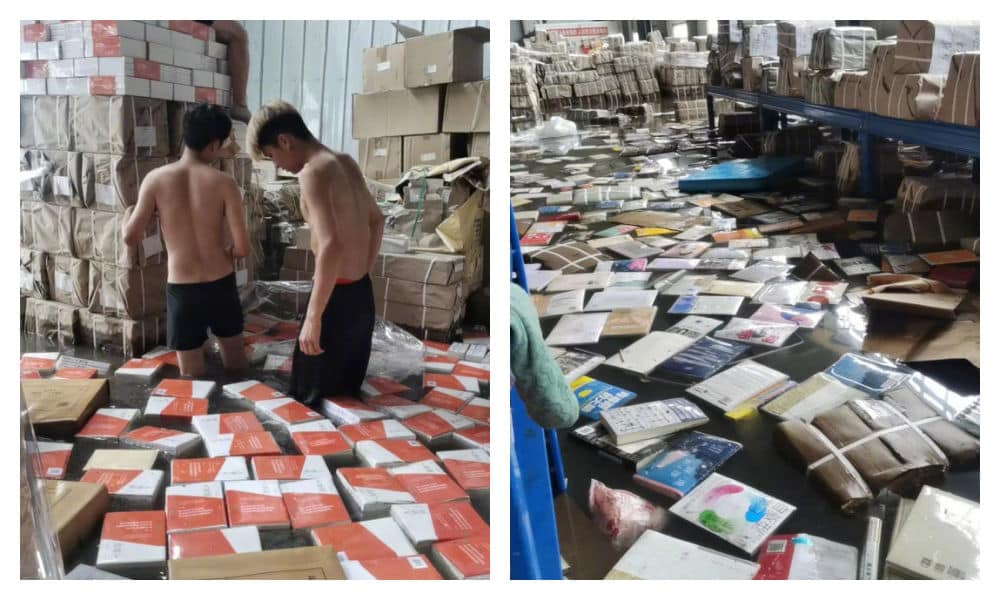China Books & Literature
No Man’s City – A Chinese Blogger’s Powerful Essay About The “Fake Lives” of Beijing Residents
An essay titled “Beijing Has 20 Million People Pretending to Live There” by Chinese blogger Zhang Wumao has gone viral on Chinese social media. The essay describes how Beijing has changed into a city that is overrun by ‘outsiders’ and no longer belongs to the ‘old Beijingers.’ The article has now been censored. Chinese state media say the essay impedes good relations between Beijing’s locals and immigrants.
Published
7 years agoon

An essay titled “Beijing Has 20 Million People Pretending to Live Here” by Chinese blogger Zhang Wumao (张五毛) has gone viral on Chinese social media, sparking wide debate on life in China’s capital. The essay describes how Beijing has changed into a city that is overrun by ‘outsiders’ and no longer belongs to the ‘old Beijingers.’ Chinese state media say the essay, which is now censored, polarizes the relations between Beijing’s locals and immigrants.
An online essay titled “Beijing Has 20 Million People Pretending to Live Here” (or: “There are 20 Million People in Beijing Pretending to Have a Life” “北京,有2000万人假装在生活”, full English translation here) by Chinese writer and blogger Zhang Wumao (张五毛) became a viral hit on WeChat and Weibo after it was published on the author’s WeChat account on July 23.
The essay is a witty yet powerful critique of Beijing and its residents. Over the last decade, and especially over the past few years, Beijing has undergone enormous changes. The city is expanding, high-rise buildings are mushrooming, while old hutong areas are bricked up and familiar neighborhoods demolished for the sake of the city’s metamorphosis in an ‘international metropolis.’
According to Mr. Zhang, the city’s rapid transformation has turned it into a place with no identity; a place that nobody can call home. The essay argues that Beijing has been overrun by migrant workers or waidiren (外地人, ‘people from outside the city’), and that these ‘outsiders’ have turned China’s capital into a place with staggering house prices and heavy traffic that lacks soul. The city no longer really belongs to native Beijingers, Zhang writes, as they cannot even recognize their old neighborhoods anymore.
The essay describes how Beijing has become so big, so full, and so expensive, that life has virtually become unsustainable. The result of Beijing’s transformation, according to the post, is that its residents, both locals and immigrants, just “pretend to live there”, leading “fake lives.”
ZHANG GUOCHEN
“It was destined to go viral. It ridicules Beijing + it talks about migrant workers + real estate market + and state of life.”
Zhang Wumao, whose real name is Zhang Guochen (张国臣), is an author born in the early 1980s. He is from Luonan, Shaanxi, and came to Beijing at the age of 25 in 2006. A year later he started blogging. He previously published the novels Spring is Burning (春天在燃烧) and Princess’s Tomb (公主坟).
Zhang’s online essay about Beijing spread like wildfire on WeChat and Weibo on Sunday. It was viewed over 5 million times within an evening and soon became a trending article on WeChat. It triggered wide debate across Chinese social media on the lives of people in Beijing.

WeChat’s “Today” overview showing dozens of mentions of Zhang’s essay earlier this week. (via zhihu.com)
On Monday and Tuesday, the essay was also republished by various Chinese media such as Tencent News, iFeng, and Sohu.com.
But on July 25, the full text was removed from all social media accounts and Chinese online newspapers. Its hashtag on Weibo (#北京有2000万人假装在生活#) is now no longer accessible.

On Tuesday, any link for the online essay came up with a ‘404 page’ saying: “Cannot open – you can no longer view this page!”
The article also disappeared from Zhang’s WeChat account.

Zhang’s Wechat account shows that the article from July 23 has now been deleted.
On Quora-like discussion platform Zhihu.com, one person said the essay was destined to become a hype: “This is a typical Wechat viral article. It ridicules Beijing + it talks about migrant workers + real estate market + and state of life. As it contains all of these elements in 1 article, the author just intended for this to become a hit.”
A SENSITIVE ESSAY
“What Beijingers increasingly feel is the suffocation of the smog and the high cost of housing. They cannot move, they cannot breathe.”
Zhang’s essay is divided into five paragraphs. In the first part, he explains that Beijingers often seem inhospitable; the city is so huge and congested, that people simply cannot find the time to see their friends in other parts of the city.
“Beijing is really too big; so big that it is simply not like a city at all. It is equivalent to 2.5 times Shanghai, 8.4 times Shenzhen, 15 times Hong Kong, 21 times New York, or 27 times Seoul. When friends from outside come to Beijing, they think they’re close to me. But actually, we’re hardly in the same city at all.”
“For 10 years, Beijing has been controlling housing, controlling traffic, and controlling the population. But this pancake is only getting wider and bigger, so much that when a school friend from Xi’an calls me to say he’s in Beijing and I ask him where he is, he tells me: “I am at the 13th Ring.” Beijing is a tumor, and no one can control how fast it is growing; Beijing is a river, and no one can draw its borders. Beijing is a believer, and only Xiong’an can bring salvation.”
The second part, which is titled ‘Beijing actually belongs to outsiders’ (北京其实是外地人的北京), claims that Beijing is one of the most beloved cities in China because of its rich cultural heritage and long history, but that this is something that is only of value to people from outside the city.
“In the 11 years since I’ve come to Beijing, I have been to the Great Wall 11 times, 12 times the Imperial Palace, 9 times to the Summer Palace, and 20 times to the Bird’s Nest. I feel emotionless about this city’s great architecture and long history. (..) Going into the Forbidden City, I only see one empty house after the other – it’s less interesting than the lively pigsties we have in my native village.”
“Upon mentioning Beijing, many people first think of the Palace Museum, Houhai, 798; they think of history, culture, and high-rise buildings. Is that a good thing or a bad thing? It’s good! Does it make us proud? It does! But you can’t make food out of these things. What Beijingers increasingly feel is the suffocation of the smog and the high cost of housing. They cannot move, they cannot breathe.”
He then goes on to mock the old residents of Beijing, who still have the upper hand in the real estate market despite the flood of new immigrants, all owning “five-room houses.” The old Beijingers lead very different lives from the migrant workers, who are caught in a negative spiral of hard work, no social life, and finding a place to settle down.
“In Beijing, the migrant workers, who have no real estate from previous generations, are destined to be trapped in their house for life. They strive for over a decade to buy an apartment the size of a bird cage; then spend another decade struggling to get a house that has two rooms rather than one. If that goes well, congratulations, you can now consider an apartment in the school district.”

“With a house in the school district, children can attend Tsinghua or Peking University. But Tsinghua graduates will still not be able to afford a room in that district. They will then either need to stay crammed together in the old shabby family apartment, or start from scratch, struggling for another apartment.”
“For Beijing’s new immigrants, the city is a distant place where they can’t stay; for Beijing’s old residents, the city is an old home they can’t return to.”
In the final part of the essay, however, Zhang shows his sympathy for the old residents of Beijing:
“I once took a taxi to Lin Cui Road. Because I was afraid the driver wouldn’t know the way, I opened the navigation on my phone to help him find the way. He said he did not need the navigation because he knew that place. There was a flour mill there 30 years ago, he said, it was demolished 10 years ago, and they built low-income housing there. I asked him how he knew this so well. “That used to be my home,” he said, the sorrow showing in his face.”
“I could hear nostalgia and resentment from the driver’s words. For Beijing’s new immigrants, the city is a distant place where they can’t stay; for Beijing’s old residents, the city is an old home they can’t return to.”
“We, as outsiders, ridicule Beijing on the one hand, while on the other hand, we cherish our hometowns. But in fact, we can still go back to our hometown. It is still there. (..) But for the old Beijingers, there really is no way to go back to their hometown. It has changed with unprecedented speed. We can still find our grandfather’s old house. The majority of Beijingers can only find the location of their old homes through the coordinates on a map.”
He concludes his article by highlighting the recent demolishment of old Beijing shops and restaurants, saying that the city is being renovated but is becoming less livable.
“Those who chase their dreams of success are now escaping [Beijing]. They’re off to Australia, New Zealand, Canada, or the West Coast of the United States. Those who’ve lost hope of chasing their dreams are also escaping. They return to Hebei, the Northeast, their hometowns.”
He ends by writing: “There are over 20 million people left in this city, pretending to live. In reality, there simply is no life in this city. Here, there are only some people’s dreams and everybody’s jobs.”
CHINESE MEDIA RESPONSES
“The contrast between old Beijingers and new immigrants is exaggerated, and it polarizes the relationship between locals and outsiders.”
Despite censorship of the actual text, Zhang’s essay is widely discussed by Chinese official media.
State media outlet People’s Daily (@人民日报) writes on Weibo:
“The essay ‘Beijing Has 20 Million People Pretending to Live There’ is a viral hit but is not approved of. There really is such a thing as the “Big City Disease”, and we do not need to pretend as if people in first-tier cities are not struggling and facing hardships. But in Beijing, both locals and outsiders are alive and kicking; they are all the more real because of their dreams. Making a living is hard, but it is the days of watching flowers blossom and wilt that are full of life. The city and its people don’t have it easy, but they have to show some tolerance for each other and then they can both succeed.”
Xinhua News Agency also published a response to the article titled: “Lives in the City Cannot Be Fake” (“一个城市的生活无法“假装“).
Lashing out against Mr. Zhang, they write that: “Beijing has no human warmth, Beijing is a city of outsiders, old Beijingers can’t go back to their city – behind every one of these sentences is not the ‘fakeness’ of Beijing, but the clamor of the author’s emotions about ‘coming to Beijing.'”
State broadcaster CCTV (@央视新闻) also responds to the essay on Weibo, saying:
“Over the past few days, the essay ‘Beijing Has 20 Million People Pretending to Live There’ has exploded on the Internet, but how the text portrays the contrast between old Beijingers and new immigrants is exaggerated, and it polarizes the relationship between native Beijingers and outsiders. In reality, Beijing is not as cold as it is described in the essay. Everyone already knows that it’s not easy living in a big city. The future of Beijing is in the hands of competent, daring and hardworking people who pursue their dreams.”
A STORM OF DEBATE
“I am one of these 20 million people, and my life is not fake – I am living it.”
On social media, many netizens commented on the state media’s responses to Zhang, saying they were tired of the repeated emphasis on “people’s dreams.” One person said: “My belly is empty, what are you talking about dreams for?! Dreams cannot guarantee our most basic needs for survival.”
Many people on Weibo and QQ also applauded Zhang’s essay for being “well-written”, “honest”, and “real.”
But there are also those who do not agree with the essay and take offense at how it describes Beijingers leading “fake” or “pretense” lives. A Beijing resident nicknamed ‘Little Fish’ (@小小的爱鱼) commented: “What on earth gave him the courage to speak on behalf of 20 million Beijing people? I am one of these 20 million people, and sorry, but my life is not fake – I am living it.”
“I work overtime until 9 pm, then take the bus and subway and won’t arrive home before 23:38, then quickly rinse my face and brush my teeth and roll into bed. But it’s still life. What life and being alive is all about ultimately is a personal issue,” one other netizen from Beijing says.
“Mr. Zhang,” one angry commenter writes: “You can leave this cold and big city of Beijing, and go back to your ‘real’ live in that pigsty of yours that’s supposedly more imposing than the Forbidden City.”
The recent hype surrounding Zhang’s essay somewhat resembles the overnight buzz over the autobiographical essay of Beijing migrant worker Fan Yusu. This essay also described various hardships in the lives of Beijing migrant workers.
Fan Yusu’s essay and posts related to it were also taken offline after several days when discussions on the account spread across Chinese social media.
Zhang’s hit essay shows that the combination of writing about “migrant workers + Beijing + real estate + state of life” = indeed one that is bound to attract wide attention and debate on social media. Although it is also a recurring topic in China’s official media, those channels prefer to focus on the idea of hardworking people who pursue their (Chinese) dreams, rather than to spread a narrative about people living “fake lives” in a cold city.
One commenter says: “Whether you fake it or you try hard, it’s all okay: this is Beijing. It’s not livable, but you sure can make a living.”
By Manya Koetse
Follow @whatsonweibo
Special thanks to Diandian Guo.
©2017 Whatsonweibo. All rights reserved. Do not reproduce our content without permission – you can contact us at info@whatsonweibo.com.
Manya Koetse is the founder and editor-in-chief of whatsonweibo.com. She is a writer, public speaker, and researcher (Sinologist, MPhil) on social trends, digital developments, and new media in an ever-changing China, with a focus on Chinese society, pop culture, and gender issues. She shares her love for hotpot on hotpotambassador.com. Contact at manya@whatsonweibo.com, or follow on Twitter.

Also Read
China Books & Literature
Why Chinese Publishers Are Boycotting the 618 Shopping Festival
Bookworms love to get a good deal on books, but when the deals are too good, it can actually harm the publishing industry.
Published
2 months agoon
June 8, 2024By
Ruixin Zhang
JD.com’s 618 shopping festival is driving down book prices to such an extent that it has prompted a boycott by Chinese publishers, who are concerned about the financial sustainability of their industry.
When June begins, promotional campaigns for China’s 618 Online Shopping Festival suddenly appear everywhere—it’s hard to ignore.
The 618 Festival is a product of China’s booming e-commerce culture. Taking place annually on June 18th, it is China’s largest mid-year shopping carnival. While Alibaba’s “Singles’ Day” shopping festival has been taking place on November 11th since 2009, the 618 Festival was launched by another Chinese e-commerce giant, JD.com (京东), to celebrate the company’s anniversary, boost its sales, and increase its brand value.
By now, other e-commerce platforms such as Taobao and Pinduoduo have joined the 618 Festival, and it has turned into another major nationwide shopping spree event.
For many book lovers in China, 618 has become the perfect opportunity to stock up on books. In previous years, e-commerce platforms like JD.com and Dangdang (当当) would roll out tempting offers during the festival, such as “300 RMB ($41) off for every 500 RMB ($69) spent” or “50 RMB ($7) off for every 100 RMB ($13.8) spent.”
Starting in May, about a month before 618, the largest bookworm community group on the Douban platform, nicknamed “Buying Like Landsliding, Reading Like Silk Spinning” (买书如山倒,看书如抽丝), would start buzzing with activity, discussing book sales, comparing shopping lists, or sharing views about different issues.

Social media users share lists of which books to buy during the 618 shopping festivities.
This year, however, the mood within the group was different. Many members posted that before the 618 season began, books from various publishers were suddenly taken down from e-commerce platforms, disappearing from their online shopping carts. This unusual occurrence sparked discussions among book lovers, with speculations arising about a potential conflict between Chinese publishers and e-commerce platforms.
A joint statement posted in May provided clarity. According to Chinese media outlet The Paper (@澎湃新闻), eight publishers in Beijing and the Shanghai Publishing and Distribution Association, which represent 46 publishing units in Shanghai, issued a statement indicating they refuse to participate in this year’s 618 promotional campaign as proposed by JD.com.
The collective industry boycott has a clear motivation: during JD’s 618 promotional campaign, which offers all books at steep discounts (e.g., 60-70% off) for eight days, publishers lose money on each book sold. Meanwhile, JD.com continues to profit by forcing publishers to sell books at significantly reduced prices (e.g., 80% off). For many publishers, it is simply not sustainable to sell books at 20% of the original price.
One person who has openly spoken out against JD.com’s practices is Shen Haobo (沈浩波), founder and CEO of Chinese book publisher Motie Group (磨铁集团). Shen shared a post on WeChat Moments on May 31st, stating that Motie has completely stopped shipping to JD.com as it opposes the company’s low-price promotions. Shen said it felt like JD.com is “repeatedly rubbing our faces into the ground.”
Nevertheless, many netizens expressed confusion over the situation. Under the hashtag topic “Multiple Publishers Are Boycotting the 618 Book Promotions” (#多家出版社抵制618图书大促#), people complained about the relatively high cost of physical books.
With a single legitimate copy often costing 50-60 RMB ($7-$8.3), and children’s books often costing much more, many Chinese readers can only afford to buy books during big sales. They question the justification for these rising prices, as books used to be much more affordable.
Book blogger TaoLangGe (@陶朗歌) argues that for ordinary readers in China, the removal of discounted books is not good news. As consumers, most people are not concerned with the “life and death of the publishing industry” and naturally prefer cheaper books.
However, industry insiders argue that a “price war” on books may not truly benefit buyers in the end, as it is actually driving up the prices as a forced response to the frequent discount promotions by e-commerce platforms.
China News (@中国新闻网) interviewed publisher San Shi (三石), who noted that people’s expectations of book prices can be easily influenced by promotional activities, leading to a subconscious belief that purchasing books at such low prices is normal. Publishers, therefore, feel compelled to reduce costs and adopt price competition to attract buyers. However, the space for cost reduction in paper and printing is limited.
Eventually, this pressure could affect the quality and layout of books, including their binding, design, and editing. In the long run, if a vicious cycle develops, it would be detrimental to the production and publication of high-quality books, ultimately disappointing book lovers who will struggle to find the books they want, in the format they prefer.
This debate temporarily resolved with JD.com’s compromise. According to The Paper, JD.com has started to abandon its previous strategy of offering extreme discounts across all book categories. Publishers now have a certain degree of autonomy, able to decide the types of books and discount rates for platform promotions.
While most previously delisted books have returned for sale, JD.com’s silence on their official social media channels leaves people worried about the future of China’s publishing industry in an era dominated by e-commerce platforms, especially at a time when online shops and livestreamers keep competing over who has the best book deals, hyping up promotional campaigns like ‘9.9 RMB ($1.4) per book with free shipping’ to ‘1 RMB ($0.15) books.’
This year’s developments surrounding the publishing industry and 618 has led to some discussions that have created more awareness among Chinese consumers about the true price of books. “I was planning to bulk buy books this year,” one commenter wrote: “But then I looked at my bookshelf and saw that some of last year’s books haven’t even been unwrapped yet.”
Another commenter wrote: “Although I’m just an ordinary reader, I still feel very sad about this situation. It’s reasonable to say that lower prices are good for readers, but what I see is an unfavorable outlook for publishers and the book market. If this continues, no one will want to work in this industry, and for readers who do not like e-books and only prefer physical books, this is definitely not a good thing at all!”
By Ruixin Zhang, edited with further input by Manya Koetse
Independently reporting China trends for over a decade. Like what we do? Support us and get the story behind the hashtag by subscribing:
Spotted a mistake or want to add something? Please let us know in comments below or email us. First-time commenters, please be patient – we will have to manually approve your comment before it appears.
©2024 Whatsonweibo. All rights reserved. Do not reproduce our content without permission – you can contact us at info@whatsonweibo.com.
China Books & Literature
The Many Books Lost in the China Floods: Catastrophic Flooding Hits Zhuozhou’s Publishing Industry
After Typhoon Doksuri, some major warehouses in Zhuozhou have seen their depots transform into a sea of floating books.
Published
12 months agoon
August 2, 2023
Dozens of prominent Chinese publishing companies and book warehouses based in Hebei’s Zhuozhou, a major hub for the publishing industry, have witnessed their book depots destroyed as water levels surged as high as the second floor. Distribution will be at a standstill for at least 15 days.
Zhuozhou (涿州) is a county-level city in Baoding, Hebei Province, known as a major hub for the Chinese publishing industry. It is one of the areas that has been badly affected by the heavy rainfall and flash floodings China has seen this week, after Typhoon Doksuri moved from the Philippines to Taiwan toward Beijing and surrounding regions in mainland China.
In Zhuozhou, dozens of publishing warehouses were affected by floods and water damage due to the storm, resulting in losses amounting to hundreds of millions of yuan. Zhuozhou’s print media industry is closely linked with the center of China’s publishing industry in Beijing, just 25 miles away.
Some warehouses, such as that of Beijing China Media Times, are as large as 8000 square meters, housing over three million books. According to Sina News, one area that housed around 200 publishing companies was almost entirely flooded.
A Weibo post by the Hong Kong Ta Kung Wen Wei Media Group (HKTKWW, @大公文匯網) showed the status quo at some warehouses, which had changed into a sea of books.

Posted on Weibo by HKTKWW, @大公文匯網, the situation at the Beijing China Media Times book warehouse in Zhuozhou.

Posted on Weibo by HKTKWW, @大公文匯網, the situation at the Beijing China Media Times book warehouse in Zhuozhou.
Publisher Books China (中图网), known as an industry “outlet store” for selling discounted and out-of-print books, also saw its central Zhuozhou warehouse completely flooded.
Around 100 of their staff members remained trapped at the office on Tuesday night without any food, drinks, or blankets, while water levels continued to rise. An additional cause for concern was the strong odor emanating from a nearby adhesive tape factory. Some employees suspected that toxic gases might have leaked, leading to several of them feeling unwell and vomiting after exposure.
According to China News (@中国新闻网), all employees were safely evacuated on Wednesday.

Photo posted on Weibo by China News (@中国新闻网), showing how the Books China (中图网) major warehouse was severely impacted by the recent floods, with water levels rising up to the second floor.

In an interview with Chinese newspaper Southern Weekend (南方周末), Beijing China Media Times CEO Ran Zijian (冉子健) revealed that his company had not received any advance warning about the heavy rains and the possibility of flooding, despite the area being prone to floods due to its low-lying terrains. All of the company’s 3.6 million books are now submerged underwater.

Photos provided to Southern Weekend, Weibo.
The water levels rose so rapidly on Tuesday that there was hardly any time to rescue the books, making the evacuation of staff members the first priority. Bookseller Zou Bin (邹斌) told Southern Weekend that he saw the water levels rising so fast in his 5,000 square meter warehouse that he basically witnessed “25 million yuan [$3.5 million] disappear in an hour, powerless to do anything about it.”
According to several Chinese news outlets, the distribution and dispatching of books will be impossible for numerous publishing houses based in Zhuozhou for at least the next 15 days. As the local book industry continues to assess the damages, it remains uncertain how severely the companies have been affected at this stage. For some, it feels like they are starting from scratch all over again.
But most netizens emphasize that it’s more important that employees are safe, as people’s lives are more important than paper books. “Who cares about dispatching books at this time?” some commenters wonder, while others express grief about all the books lost, saying, “It’s just such a pity.”
By Manya Koetse
Get the story behind the hashtag. Subscribe to What’s on Weibo here to receive our newsletter and get access to our latest articles:
Spotted a mistake or want to add something? Please let us know in comments below or email us. First-time commenters, please be patient – we will have to manually approve your comment before it appears.
©2023 Whatsonweibo. All rights reserved. Do not reproduce our content without permission – you can contact us at info@whatsonweibo.com.
Subscribe

Weibo Watch: The Future is Here

“Bye Bye Biden”: Biden’s Many Nicknames in Chinese

Enjoying the ‘Sea’ in Beijing’s Ditan Park

A Triumph for “Comrade Trump”: Chinese Social Media Reactions to Trump Rally Shooting

Weibo Watch: Get Up, Stand Up

The Tragic Story of “Fat Cat”: How a Chinese Gamer’s Suicide Went Viral

“Old Bull Eating Young Grass”: 86-Year-Old Chinese Painter Fan Zeng Marries 36-Year-Old Xu Meng

A Brew of Controversy: Lu Xun and LELECHA’s ‘Smoky’ Oolong Tea

Singing Competition or Patriotic Fight? Hunan TV’s ‘Singer 2024’ Stirs Nationalistic Sentiments

Zara Dress Goes Viral in China for Resemblance to Haidilao Apron

Weibo Watch: The Battle for the Bottom Bed

About the “AI Chatbot Based on Xi Jinping” Story

China’s Intensified Social Media Propaganda: “Taiwan Must Return to Motherland”

Weibo Watch: Telling China’s Stories Wrong

Saying Goodbye to “Uncle Wang”: Wang Wenbin Becomes Chinese Ambassador to Cambodia
Get in touch
Would you like to become a contributor, or do you have any tips or suggestions? Get in touch here!
Popular Reads
-

 China Insight3 months ago
China Insight3 months agoThe Tragic Story of “Fat Cat”: How a Chinese Gamer’s Suicide Went Viral
-

 China Music4 months ago
China Music4 months agoThe Chinese Viral TikTok Song Explained (No, It’s Not About Samsung)
-

 China Digital10 months ago
China Digital10 months agoToo Sexy for Weibo? Online Discussions on the Concept of ‘Cābiān’
-

 China Arts & Entertainment12 months ago
China Arts & Entertainment12 months agoBehind 8 Billion Streams: Who is Dao Lang Cursing in the Chinese Hit Song ‘Luocha Kingdom’?




